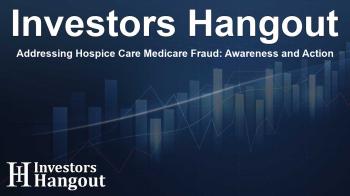Addressing Hospice Care Medicare Fraud: Awareness and Action

Understanding Hospice Care Medicare Fraud
The New York StateWide Senior Action Council (StateWide) is an impactful 53-year-old non-profit organization dedicated to assisting approximately 2.5 million senior citizens. Recently, they have spotlighted a concerning trend in their monthly Medicare Fraud identification: Hospice Care Medicare Fraud.
This initiative is part of the Senior Medicare Patrol (SMP), which equips older adults and their caregivers with the knowledge to detect, prevent, and report healthcare fraud, errors, and abuse. StateWide administers this program for New York State, acting as a crucial resource for senior citizens across the region.
What is Hospice Care?
Hospice care focuses on offering comfort and enhancing the quality of life for individuals who are terminally ill, rather than striving for curative measures. This program encompasses various services including medical consultations, respite care, necessary medications, and durable medical equipment aimed at pain relief.
The Risks of Hospice Care Fraud
Maria Alvarez, Executive Director of StateWide, emphasizes the vulnerability of seniors to scams related to hospice care. Unscrupulous individuals may approach older adults with enticing offers such as complimentary in-home help or cleaning services. However, the true intentions behind these offers are often deceptive.
Scammers might falsely enroll unsuspecting individuals in hospice care programs, subsequently billing Medicare for services that were neither requested nor rendered. Alvarez states, "These offers often come with the hidden motive of enrolling you in hospice care without your awareness, leading to unauthorized charges to Medicare."
Common Scamming Tactics
Scammers employ various tactics to lure seniors. These may include:
- Visiting homes unannounced
- Making unsolicited phone calls
- Sending text messages and emails
- Utilizing false advertisements
Identifying Warning Signs
Alvarez provides essential tips for seniors to recognize potential hospice fraud and protect themselves against it. Here are some vital warning signs:
- Certification Requirement: Only a licensed physician can certify a patient for hospice services, specifically for those with an expected lifespan of six months or less.
- Understand Coverage Limitations: Medicare does not cover free services, including house cleaning.
- Gift Acceptance Caution: Seniors should refrain from accepting gifts in exchange for purported services.
- Review Documentation: Regularly check Medicare Summary Notices (MSN) or Explanation of Benefits (EOB) for any unauthorized charges.
Support and Resources
The NYS Senior Medicare Patrol offers invaluable assistance to seniors dealing with concerns about nursing home fraud, quality of care, or any related issues. Their certified counselors are available for guidance. Seniors can reach out at 800-333-4374 for questions or to report misinformation.
StateWide also aims to educate the Medicare population about the importance of protecting themselves from healthcare fraud. They highlight that to report suspected Medicare fraud or seek advice, one can contact the NYS Medicare Fraud Helpline at 800-333-4374.
Combatting Medicare Fraud
Every year, Medicare fraud costs taxpayers an astounding $60 billion. To address this significant issue, StateWide launched its Fraud of the Month program in 2022, demonstrating their commitment to raising awareness about scams targeting seniors statewide.
By informing and educating the public, StateWide hopes to reduce the risk of scams that exploit older adults, urging seniors and their families to stay informed and vigilant against such deceptive practices.
Frequently Asked Questions
What is hospice care?
Hospice care focuses on providing comfort and support to terminally ill patients rather than seeking to cure their illnesses.
How can seniors protect themselves from hospice fraud?
Seniors can protect themselves by being cautious of unsolicited offers and always verifying services through trusted sources.
Who should certify a patient for hospice care?
Only a licensed physician can certify a patient for hospice care, specifically for patients whose life expectancy is six months or less.
What should seniors do if they suspect fraud?
If fraud is suspected, seniors should contact the NYS Senior Medicare Patrol at 800-333-4374 or report it through their helpline.
What is the role of the Senior Medicare Patrol?
The Senior Medicare Patrol educates older adults about healthcare fraud and provides support in combating these fraudulent activities.
About The Author
Contact Lucas Young privately here. Or send an email with ATTN: Lucas Young as the subject to contact@investorshangout.com.
About Investors Hangout
Investors Hangout is a leading online stock forum for financial discussion and learning, offering a wide range of free tools and resources. It draws in traders of all levels, who exchange market knowledge, investigate trading tactics, and keep an eye on industry developments in real time. Featuring financial articles, stock message boards, quotes, charts, company profiles, and live news updates. Through cooperative learning and a wealth of informational resources, it helps users from novices creating their first portfolios to experts honing their techniques. Join Investors Hangout today: https://investorshangout.com/
The content of this article is based on factual, publicly available information and does not represent legal, financial, or investment advice. Investors Hangout does not offer financial advice, and the author is not a licensed financial advisor. Consult a qualified advisor before making any financial or investment decisions based on this article. This article should not be considered advice to purchase, sell, or hold any securities or other investments. If any of the material provided here is inaccurate, please contact us for corrections.

